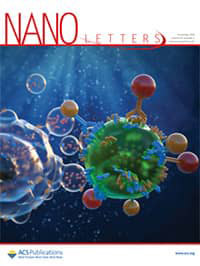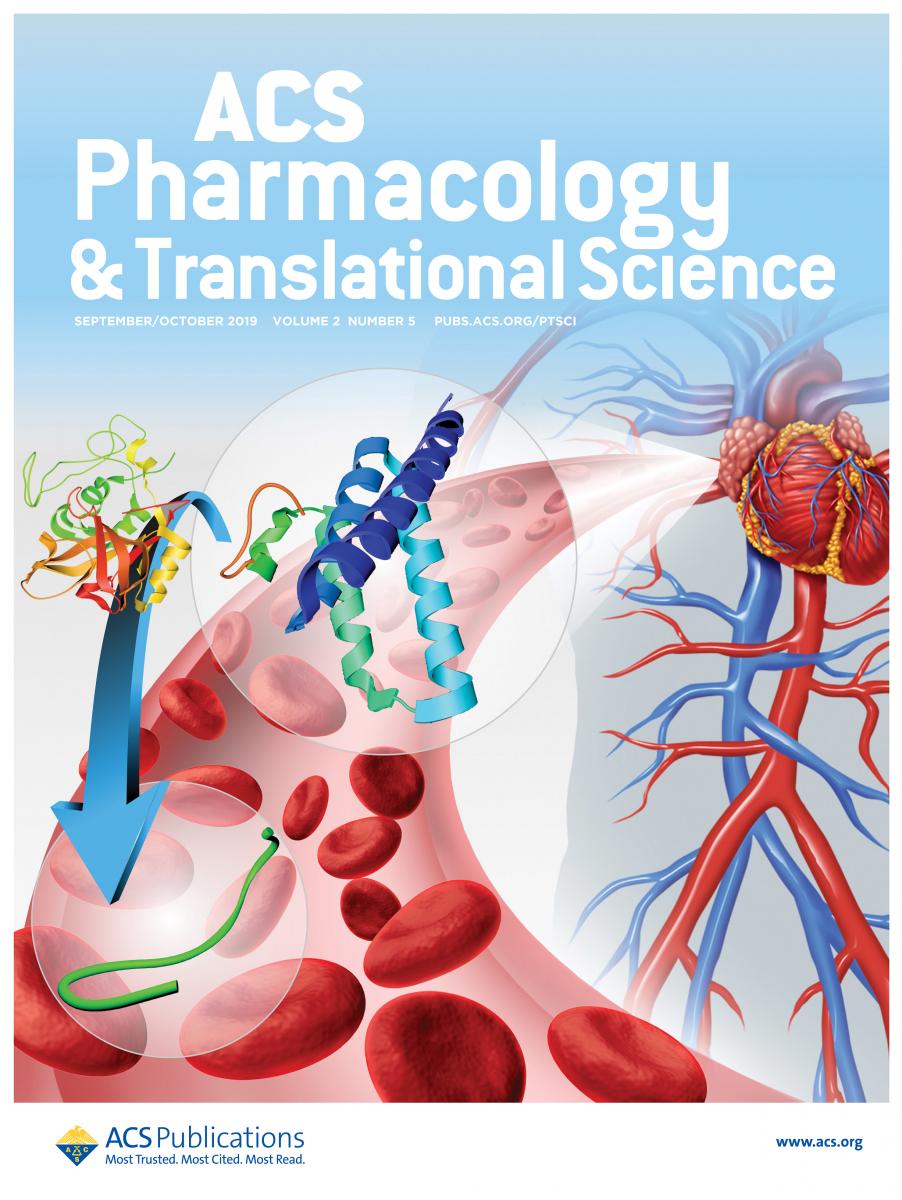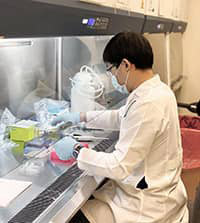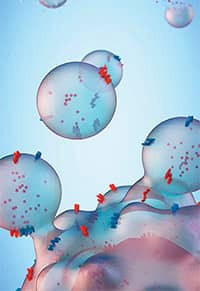Tulane develops test that can detect COVID-19 that nasal swabs miss
(February 20, 2021) Tulane University researchers have developed a highly sensitive blood test that can detect COVID-19 in rare cases when infections were missed by nasal swab PCR tests.
Rapid COVID19 Test: CRISPR Technology Based Diagnosis -By Tony Hu of Tulane University (SARS COV-2)
(January 19, 2021) In this video, you will get clear information on recent new rapid technology which is going to get approval by the end of this January and probably we expect to use it within next 6 months. Find out more about this technology or kit version which uses saliva as sample source instead of nasal swab for COVID-19 or SARS CoV-2 detection or diagnosis.
Can Crispr-Based Covid-19 Testing Using Smartphones Slow The Pandemic?
(December 13, 2020) Two recent proof-of-concept studies using novel smartphone-based Crispr technology coupled with optics and fluorescence detection may be poised to change how we approach not only rapid testing and screening, but also testing for acute infection.
Saliva-based smartphone COVID test gives result in 15 mins: Scientists
(December 12, 2020) A portable, ultrasensitive saliva-based COVID-19 test which is read by a smartphone within 15 minutes has been developed by scientists in the US.
New COVID-19 Testing: Tulane University Dr Tony Hu Q&A
(March 29, 2020) Tulane University Professor Tony Hu, PhD, Weatherhead Presidential Chair, holds a Q&A about new testing possibilities for COVID-19 - also knows as "diagnostics" - that he is working on at the intersection of engineering & medicine.
New lung cancer biomarker could significantly improve patient outcomes
(March 12, 2020) A new protein has been identified on tumor-derived extracellular vesicles that indicates if a lung tumor is likely to metastasize, according to research published in Science Advances on March 11. A minimally invasive biomarker test to catch cancer early could significantly improve patient outcomes.
Tulane researchers developing rapid test for tuberculosis with DOD grant
(February 21, 2020) Led by Tony Hu, the Weatherhead Presidential Chair in Biotechnology Innovation at Tulane University School of Medicine, researchers at Tulane, Baylor College of Medicine and NanoPin Technologies, Inc. are now developing a rapid, reliable and highly specific test to allow rapid diagnosis of all forms of Tuberculosis (TB), the leading worldwide cause of death from infectious disease.
 Tony Hu, PhD, has been named the Weatherhead Presidential Chair in Biotechnology Innovation
Tony Hu, PhD, has been named the Weatherhead Presidential Chair in Biotechnology Innovation
(July 16, 2019) Tulane University has named research scientist Tony Hu, PhD, a pioneer in developing advanced diagnostics for personalized medicine, as its second endowed presidential chair.
To fill presidential chairs, Tulane recruits exceptional, internationally recognized scholars whose work transcends traditional academic disciplines.
 Meryl Rodrigues' paper accepted by Nano Letters journal as a cover story (PDF)
Meryl Rodrigues' paper accepted by Nano Letters journal as a cover story (PDF)
Meryl's paper on Rapid Lipid-Based Approach for Normalization of Quantum-Dot-Detected Biomarker Expression on Extracellular Vesicles in Complex Biological Samples appeared as the cover story on Nano Letters.
 Fangfang Zhang’s paper was accepted by ACS journal as a cover story (PDF)
Fangfang Zhang’s paper was accepted by ACS journal as a cover story (PDF)
Cathepsin B Dependent Cleavage Product of Serum Amyloid A1 Identifies Patients with Chemotherapy-Related Cardiotoxicity
Improvements in long-term cancer survival rates have resulted in an increase in the prevalence of chemotherapy-linked cardiac failure, but treatment-induced cardiac injuries may not be detected until long after therapy. Monitoring cardiac function is recommended; however, cardiovascular injury in cancer patients differs from those with primary cardiac dysfunction, which limits the utility of traditional cardiac biomarkers.
 PBS TV show Catalyst: Tuberculosis
PBS TV show Catalyst: Tuberculosis
“Catalyst” finds scientists using nanotechnology to tackle the age-old threat of Tuberculosis.
Rapid TB Test for Kids from ASU Biodesign Institute on Vimeo.
ASU Biodesign Institute researcher Tony Hu, PhD invented a rapid Tuberculosis (TB) test that allows doctors to diagnose the deadly infection faster and more accurately than it is now. Nearly 5,000 people die from TB every day and some strains of the disease are becoming more drug-resistant. Hu's new research focuses on adapting the new rapid test for child patients.
FULL STORY --https://biodesign.asu.edu/news/27m-nih-award-allows-asu-professor-extend-potential-benefits-rapid-tb-test-children
Nanoparticles Might Enhance Diagnosis of Mycobacterium tuberculosis Infection
(May 9, 2017)
A new test to rapidly identify worldwide TB infections
(March 27, 2017) Tuberculosis (TB), once better known as consumption for the way its victims wasted away, has a long and deadly history, with estimates indicating it may have killed more people than any other bacterial pathogen...Now, a group of scientists from Arizona, Texas and Washington DC has teamed up to develop the first rapid blood test to diagnose and quantitate the severity of active TB cases...Led by Tony Hu, a researcher at Arizona State University's Biodesign Institute, eight research groups, including the Houston Methodist Research Institute and scientists at the National Institutes of Health, are harnessing the new field of nanomedicine to improve worldwide TB control.
 Life in a Bubble
Life in a Bubble
Biomedical engineers may have found a way of combating one of the deadliest forms of cancer, pancreatic cancer, with a diagnostic method that can catch it, even at its early stages.
Pancreatic cancer is particularly deadly because it is difficult to detect and diagnose early. Patients usually also have no symptoms until the disease has already spread to other organs, earning it the grim title, “the silent killer”.
Improving Ebola Detection from ASU Biodesign Institute on Vimeo.
Tony Hu, PhD is partnering with the U.S. Army to further develop a blood test that can detect biomarkers of Ebola. Diluted patient blood samples are mixed with porous silicon nanodisks (pSiNDs) then a machine called a mass spectrometer (MS) measures the mass of all the molecules bound by the pSiNDs. The method, known as pSiND-MS, is very sensitive and can identify specific amino acid sequences of peptides belonging to viruses like Ebola.
Innovative Nanotechnology for Cancer Diagnostics
(February 15, 2017) An interview with Dr. Tony Hu, Associate Professor, Biodesign Virginia G. Piper Center for Personalized Diagnostics, Arizona State University.
Sentinels in the blood: A new diagnostic for pancreatic cancer
(February 6, 2017) Despite enormous research strides, detection methods for many diseases remain cumbersome and expensive, and often uncover illness only at advanced stages, when patient outcomes can be bleak. One such illness is pancreatic cancer, which may display no obvious symptoms in its early stages, yet can develop aggressively...Now, however, Tony Hu, a researcher in the Biodesign Virginia G. Piper Center for Personalized Diagnostics and his colleagues have devised a crafty method to identify pancreatic cancer early in its development.
